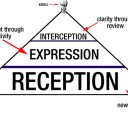Social media, that flimsy term given to Twitter, Facebook et al, is not simply a form of new media in the same way that Web 1.0 and 2.0 were. The social aspect of new media causes it to resemble a pulsing organism, which moves in waves at cultural impetus. It can be somewhat unpredictable, a keyboard playing cat can have more impact than Obama rhetoric, despite poignancy.
There are those of us who ride the waves, inputting what we can be ultimately being swept back and forth, hopefully becoming more educated to the world (or at least, the world of media) around us on the simple principle that exposure is one of the greatest forms of education. But then there are others who try to manipulate the beast, grab its tail and force it into a cycle of banality. Sometimes the manipulation is harmless, a simple viral video or Kanye West meme, but some manipulations may have greater consequences.
With apologies to Jess, what follows is my thoughts on the possible PR campaign that might have occurred behind the naming competition. Whether it ends out true or not, the concept is interesting in its impact and use of social networking as a marketing tool.
1. Create a new brand and challenge people to name it.
This step is pretty straight forward. It’s not the first competition to ask for a name, and the idea is pretty mundane in itself. In fact, the banality of such a simple (and thoroughly boring) competition solidifies my argument – if the story stopped here, there would be no press, no boom in sales and, from an advertising perspective, no payout.
2. Take 48,000 entries and pick the one you think is worst (not mundanely bad, but actually objectionable)
Okay, so they weighed their options. Pick a good name, get minor press, story fades. Pick a bad option, get audience criticism, story fades. The difference is in how audience criticism occurs. It occurs en masse and online. Facebook statuses, twitter updates and blogs all filled with “Kraft makes a naming blunder.” If you ask me, the truth is they knew all along. Not only did they pick a bad name to create bad publicity (which is, in turn, still publicity) but they picked a name which was considered to be:
a) Outdated – the iPod naming trend went at least 3 years ago.
b) Ignorant – using 2.0 out of nowhere is an obvious ploy to look ignorant in the face of techsavvy Gen X and Gen Y. “We don’t understand technology, add a 2.0 like the kids do.”
They knew their critical audience would eat it up. They would hate it and they would be loud.
3. Give some time and then announce it at a major event giving people adequate exposure to respond.
4. Wait for the press.
My image earlier about the beast eating itself is apt because social media, at this stage, is a cycle. Print media is struggling to keep up, by reporting on what social media does. Social media reports on itself, and on print media (in an attempt at gaining the weight of reportage)
The cycle begins.
iHate > iReport > iRepeat > iErupt > iReport > iRepeat
And it worked to the tune of 150%. Before the iSnack debacle, Vegemite (a product which has been around for decades had approximately 1 million hits on google)
![]() Since announcing the name, ‘iSnack” now shows up just over 525,000 times… In just a few weeks.
Since announcing the name, ‘iSnack” now shows up just over 525,000 times… In just a few weeks.
![]() That’s a 53% increase in online mentions, purely from a bad (or good?) decision.
That’s a 53% increase in online mentions, purely from a bad (or good?) decision.
5. Announce name change as if unplanned.
So, how do we restore favourability with an audience at rest? We bow to their wishes.
Kraft’s official statement is that they “have been overwhelmed by the passion for Vegemite and the new product. The new name has simply not resonated with Australians. Particularly the modern technical aspects associated with it. “
The quote implies that they had no idea prior to internet response, with their huge advertising budget, that the name would be a flop. No market research, no-one on the board vetoing, no ‘hip young web 2.0’ geek to tell them it was lame? My theory is that they knew exactly how bad it was AND (and this is the important part) that it was objectionable.
My problem with this technique is not in its manipulation of the audience but the ethics of truth in advertising. Kraft Vegemite is one of the greatest cultural icons we have, it is in almost every Australian cupboard, whether eaten or not. It would be a great shame to disrupt the value and reverence we have placed on the snack food by underhandedness.
6. Limit media exposure.
The aforementioned shame leads me to this point. Earlier today, Mumbrella tried to find some more information on the whole situation and Tim Burrowes reported this:
“I’ve been chasing this for two hours and am yet to speak to any sort of adult at Kraft who’s allowed to say anything about Vegemite, whose reputation is bleeding away by the hour.”
Is it possible that they think someone might ask them if it was planned. If they say no and it leaks later that it was, they have disturbed an honoured brand. If they say yes, they admit deceit of a nation who has always supported the product. They will not admit to it, of course, that would be a loss too easily taken.
After Mumbrella’s failure to find information, Kraft responded to media with a statement which included that, “at no point in time has the new Vegemite name been about initiating a media publicity stunt. We are proud custodians of Vegemite, and have always been aware that it is the people’s brand and a national icon.”
If it wasn’t a stunt, why do it? Of course it was a stunt.
What they mean to say that it wasn’t dubious. But as I said, they wouldn’t admit to it. It would give up their custodianship of Vegemite.
This isn’t the first time a company has claimed ignorance and been found out later. In truth, it doesn’t bother me whether my theory is proven true or false, it is entirely likely that this could have occurred, and that it may be copied by another PR company.
In my opinion, it’s a grand scheme and would be the perfect heist if pulled off (and it may just pan out that way), but the risks and implications are of a concern. I shudder to think what might happen if all advertisers begin to tread the dangerous path of trickery. While we may be asked to suspend disbelief, we deserve not to be lied to.
NEW INFORMATION: Paul Colgan (from ThePunch) has reported that “The trade name for the Vegemite-based spread, which was abandoned today amid a hail of ridicule, was registered in Hong Kong two weeks before the competition closed” along with two others names… This brings me to another point I forgot to mention. Isn’t it somewhat cruel, if my theory is correct, to put the ‘winner’ through this humiliation for the sake of publicity?
For more information about the impact of the iSnack 2.0 Marketing, see the following articles.
iEat, therefore iSnack at Onya Magazine
Kraft: We admit the new Vegemite name sucked and we’re changing it at Mumbrella



Would you believe this site is the first article I have read that has actually mentioned the ‘winner’ and the humiliation he has infact received!!
Not even Kraft have come out and publicly defended Dean. In my opinion what you say in this article sounds more and more true. And lastly, Dean didnt leave the country to escape all this talk, his holiday was planned way back in May so programs like Today Tonight (WA) should get their facts straight before they go to air. Or maybe they just had a hissy fit because he got told not to talk to anyone, or maybe he was gagged by someone from Kraft??????
Well done Kraft…. your objective to get all the media talking and free advertising has worked, and so has your plan of placing an innocent Australian in the firing line. Congratulations, Mission Accomplished!!
Samuel, you’re a voice of some reason amidst a sea of knee-jerk snipers – well thought out piece. Hope mine is, too:
http://prdisasters.com/kraft-isnack-20-not-a-pr-disaster-yet/
Best, Gerry